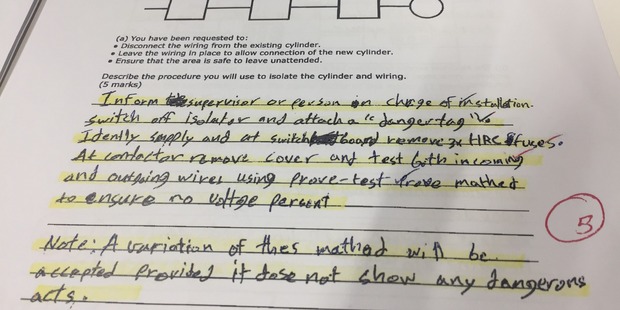Saudi students passed Unitec course despite cheating and threatening lecturer

Saudi students who copied from previous exam papers – even reproducing a marker’s note – were allowed to pass the course.
KEY POINTS
•Six Saudi students have been allowed to pass an electrical course despite cheating in their final exam. •They submitted almost identical answers in the exam, but could not answer a question verbally after the cheating was discovered. •Two Saudi government officials attended a key meeting when Unitec began investigating the case. •Unitec says the Saudi students were not treated any differently from other students who cheat. •It says “academic misconduct” including cheating was detected in 10 per cent of last year’s engineering exams. •The Saudi students’ lecturer has resigned in protest and NZQA is investigating.
Six Saudi Arabian students at Unitec have been allowed to pass an electrical course despite cheating in their final exam.
The students submitted almost identical answers to half of the questions in the exam, but could not answer one of the questions verbally after their cheating was discovered.
Four of the students included a marker’s comment from an earlier exam paper in their answer.
Their lecturer has resigned from Unitec in protest, saying the institution “places Saudi Arabian money ahead of the health and wellbeing of its staff”.
She said the seven Saudi students in her Level 4 course, which is a pre-requisite for an electrical engineering degree, “are worth $500,000 to Unitec over the next three years”.
About 100 of the 615 Saudis on student visas in New Zealand on April 1 were at Unitec.
Two officials from the Saudi Arabian Cultural Mission in Auckland attended a meeting on December 9 when Unitec’s then engineering department head David Nummy started an investigation into the case.
But Unitec rejected the lecturer’s claim that it refused to fail the students because it would have lost income from their fees. It said the decision to let the students pass the course was “in line with responses to previous instances of misconduct”.
“Unfortunately academic misconduct in assessment events is not uncommon,” Nummy wrote to the lecturer on January 30.
“In the semester 2, 2016 engineering examinations, academic misconduct (including cheating) was detected in approximately 10 per cent of the examinations conducted.”
The lecturer has complained to the NZ Qualifications Authority, which said it was investigating.
A final report from Nummy’s investigation, dated February 27 and seen by the Weekend Herald, said two of the questions in the exam were repeated from the previous year, and the students claimed to have memorised model answers for that exam.
But Nummy found it was “implausible” that they could have memorised the answers word for word, and concluded that they committed “academic misconduct” by “cheating”.
He also found that the seven male students had committed “misconduct” by intimidating and threatening their lecturer after she detected their cheating.
He imposed identical penalties on all the students – reprimands, instructions not to cheat or intimidate again, written warnings, and orders to write letters apologising to the lecturer or lose access to Unitec facilities.
He also gave all seven students C-minus grades for the course, the lowest passing grade. Unitec said later that this was an error and changed one student to a fail grade.
It said in a statement: “Unitec can confirm that no student who had not achieved the required academic standards has been awarded a qualification.”
The seven students submitted almost the same answers to questions worth 31 marks in the 60-mark exam. Four students even reproduced a marker’s note saying: “A variation of this method will be accepted provided it does not show any dangerous acts.”
“They had obviously got hold of previous exams,” the lecturer said.
She notified a colleague about the cheating the day after the exam last November.
The colleague verbally asked the students a simple question they had cheated on but they couldn’t answer it.
She said she was not sure whether the students deserved to pass. Six of them had gained at least 50 per cent in each of the three other assessments for the course, although only one gained 50 per cent of the marks available in the half of the final exam where they did not cheat.
“They should have been offered a re-sit,” she said.
But all seven students missed two re-sit opportunities in the week after the exam, and Nummy eventually gave them C-minus passes without re-sitting.
“I resigned because I couldn’t live with the fact that this was just such a huge breach of academic integrity,” the lecturer said.
“I also felt that Unitec had thrown me under a bus instead of them being there to support me.
Unitec said it was “unfortunate that the former staff member has opted to acquire the private records of students and hold these after their employment ended”.
“This is a serious breach of the students’ right to privacy.”
